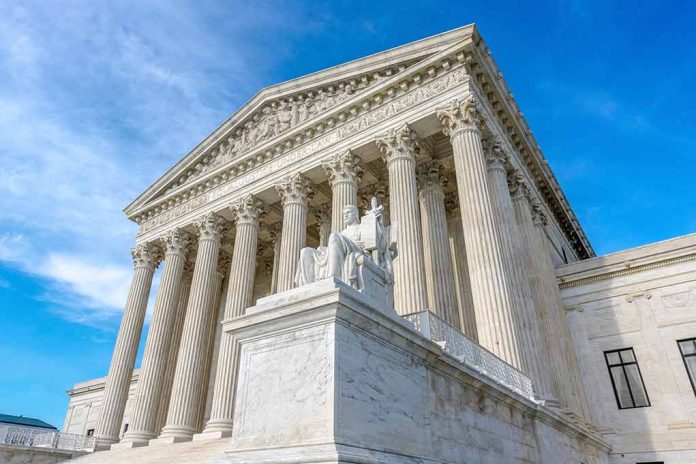
The U.S. Supreme Court unanimously ruled in favor of Hungary’s sovereign immunity in a case involving Holocaust-era asset seizures, blocking a lawsuit by survivors seeking reparations in American courts.
Key Takeaways
- The Supreme Court unanimously ruled that foreigners cannot sue Hungary in U.S. courts over Holocaust-era asset seizures.
- Justice Sonia Sotomayor wrote the court’s 9-0 opinion, emphasizing that commingling of funds alone does not satisfy the commercial nexus requirement for lawsuits under the Foreign Sovereign Immunities Act (FSIA).
- The ruling leaves open the possibility for the plaintiffs to seek legal redress in other forums outside the United States.
- This decision aligns with a previous ruling favoring Germany in a similar case, making it more challenging for such lawsuits to proceed in U.S. courts.
- The case has been remanded to the U.S. Court of Appeals for the District of Columbia Circuit for further proceedings consistent with the Supreme Court’s opinion.
Supreme Court’s Unanimous Decision
In a significant ruling concerning the Republic of Hungary v. Simon case, the U.S. Supreme Court has unanimously decided in favor of Hungary’s sovereign immunity. This decision effectively blocks a group of Holocaust survivors from pursuing a lawsuit in American courts over World War II-era asset seizures. The case, which has been closely watched by legal experts and human rights advocates, highlights the complex interplay between international law, sovereign immunity, and the pursuit of justice for historical wrongs.
Justice Sonia Sotomayor, writing for the court, delivered a clear and unequivocal opinion. The crux of the ruling centers on the interpretation of the Foreign Sovereign Immunities Act (FSIA) and its expropriation exception. This exception allows lawsuits against foreign governments in U.S. courts if the property in question has a commercial nexus to the United States. However, the Supreme Court found that the plaintiffs’ argument, which relied on the commingling of seized funds with Hungarian government funds connected to the U.S., was insufficient to establish such a nexus.
The Supreme Court unanimously sided with Hungary on Friday by rejecting a group of Holocaust survivors’ legal theory that sought to haul the country into American courts to pay compensation. https://t.co/sFYcrZMS4l
— WOWK 13 News (@WOWK13News) February 22, 2025
The Legal Reasoning Behind the Decision
The court’s decision hinged on a careful interpretation of the FSIA’s expropriation exception. Justice Sotomayor explained the court’s reasoning, stating, “The issue presented in this case is whether alleging commingling of funds alone can satisfy the commercial nexus requirement of the expropriation exception of the FSIA. The Court holds that it cannot.”
This ruling effectively sets a high bar for establishing a commercial connection between seized property and U.S. business activities, making it more challenging for similar cases to proceed in American courts. The Supreme Court’s decision vacates a previous ruling by the U.S. Court of Appeals for the D.C. Circuit, which had allowed the case to move forward.
Implications for Holocaust Survivors and Future Cases
While the ruling is undoubtedly a setback for the Holocaust survivors seeking reparations, Justice Sotomayor was careful to note that this decision does not entirely close the door on their pursuit of justice. She clarified, “Today’s decision concerns only what plaintiffs must plead to bring suit against foreign sovereigns for their actions abroad in the courts of the United States. That a particular claim cannot satisfy the expropriation exception means only that it cannot be brought here, not that it cannot be brought in any forum.”
This statement suggests that while U.S. courts may not be the appropriate venue for such claims, other legal avenues may still be available to the plaintiffs. The ruling, however, does align with a previous Supreme Court decision favoring Germany in a similar case involving the Guelph Treasure, further solidifying the court’s stance on sovereign immunity in cases related to World War II-era asset seizures.
The Historical Context and Future Outlook
The lawsuit at the center of this case sought to be a class action against Hungary and its railway system, which was responsible for transporting over 400,000 Hungarian Jews to Auschwitz in 1944. The plaintiffs, survivors and their families, aimed to seek compensation for property confiscated during the Holocaust. While this ruling presents a significant obstacle to their efforts in U.S. courts, it does not diminish the historical significance of their claims or the broader pursuit of justice for Holocaust victims.
As the case returns to the U.S. Court of Appeals for the District of Columbia Circuit for further proceedings consistent with the Supreme Court’s opinion, the future of this particular lawsuit remains uncertain. However, the ruling’s impact extends beyond this case, potentially affecting how similar claims against foreign governments for historical wrongs are approached in the U.S. legal system. It underscores the complex balance between respecting sovereign immunity and providing avenues for justice for victims of large-scale human rights abuses.
Sources:
Supreme Court Blocks Lawsuit Against Hungary for Seizing Assets During the Holocaust
Supreme Court unanimously sides with Hungary in Holocaust survivors’ lawsuit
Supreme Court deals a severe blow to Holocaust survivors’ lawsuit against Hungary













